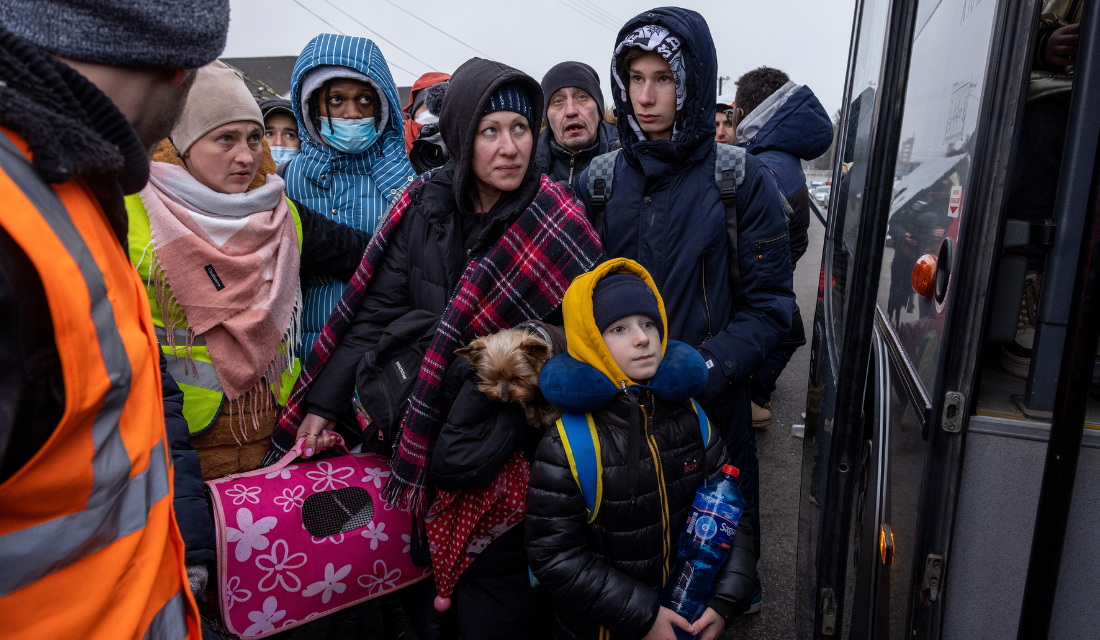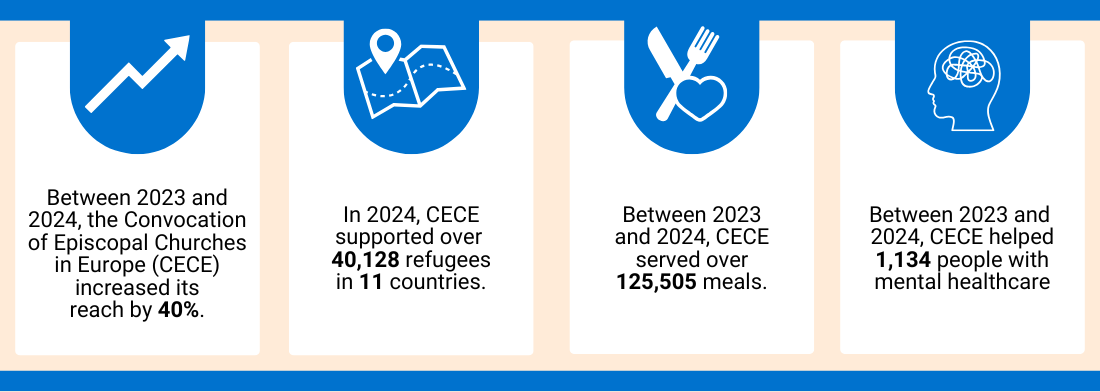Dignity and Care for Ukrainian Refugees in Europe

By Lura Steele, Senior Program Officer, Disaster Risk & Resilience
“On February 4th, I celebrated my 75th birthday with family and friends, but on February 24th, at dawn, I heard explosions that shook the ground,” Valentina shared over email.
I heard Valentina’s story in a report from our partner The Convocation of Episcopal Churches in Europe (CECE) and reached out to learn more about the woman who has overcome so much and has been met with such care. She, and millions of other refugees, have left war-torn Ukraine for new cities all over Europe. Churches have come together to help.
Valentina, a retired schoolteacher and pensioner living with a physical disability left after the first month of the war that started in February 2022. Her city, Mykolaiv, lacked water, power and food.
She was carrying only a small bag as volunteers helped her board a minibus that drove her across the border into Romania towards a new and uncertain future. Once she arrived in Romania, volunteers provided Valentina with a wheelchair, food and water and directed her towards accommodations for refugees.
“Volunteers assisted me every step of the way,” Valentina reflected.
Photos from a March 2025 visit to The Convocation of Episcopal Churches in Europe.
Some refugees are falling through the cracks
Nearly three years into the war, Europe is facing its largest refugee crisis since World War II. As of December 2024, more than 6.8 million Ukrainians are living as refugees, and millions more are internally displaced. In response, the European Union issued its first-ever temporary protection directive, granting access to healthcare, education, legal residency and employment for Ukrainian refugees.
Even with protections, refugees often face significant challenges like learning unfamiliar languages, navigating a new legal system, and finding job opportunities and reliable childcare. While getting settled in a new place, they are also managing the complex emotions resulting from the horrors of war and a deep longing for peace in their homeland. Vulnerability deepens for women, older adults and people living with disabilities, like Valentina, who often fall through the cracks of traditional aid systems.
“I wish more people would pay attention to elderly people and people with disabilities,” Valentina shared. “My disability prevents me from walking or traveling wherever I want, or discovering new places.”
How local churches support refugees across Europe
Recognizing these realities, Episcopal Relief & Development partnered with CECE to launch a refugee support program in 2022. Together in 2024, we supported over 40,000 refugees in 11 countries with health care, legal aid, language classes, employment assistance and basic essential items.
Each of the project sites are needs-based, refugee-led and supported by church volunteers, varying from art therapy for children in Germany to a fashion collective in Italy. In Cyprus, one group teaches bicycle safety, helping families feel secure while traveling around their new communities. In Belgium, families enjoy hot meals provided by a collective of local organizations.

Long-term care for the most forgotten people
In Romania, Valentina connected with a local partner organization that offered her legal counseling, emergency food aid, mentorship and medical care. The program helped her obtain a prescription for pain medication.
“Without the food assistance, it would have been very difficult, as I only receive a small pension,” Valentina shared. “Initially, we didn’t even pay for housing, and since last year, we’ve only been covering utility costs.”
For older adults like Valentina, the strain of being displaced later in life can be especially hard. Oftentimes, older refugees’ children are not with them to offer care–choosing to stay in the conflict area or migrating to larger job markets. Still, through compassionate, community-based support, refugees like Valentina find hope.
Hope amid displacement
Around the world, record levels of displacement are being driven by conflict, climate change and systemic inequality. An increasing number of people are risking their lives and the lives of people they love for safety and stability. It’s easy to feel overwhelmed or powerless in the face of such need. However, our program with CECE shows what’s possible when we prioritize dignity and local leadership as we work towards a more just world.
“Of course, we all want to go home. How much longer will we have to wait? No one knows,” Valentina said. “But I’m very grateful for the help.”
Learn more about how Episcopal Relief & Development responds to disasters and crises.
 |
Lura Steele is the Senior Program Officer, Disaster Risk & Resilience at Episcopal Relief & Development |


